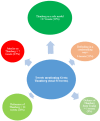Online Attitudes and Information-Seeking Behavior on Autism, Asperger Syndrome, and Greta Thunberg
- PMID: 34067114
- PMCID: PMC8124294
- DOI: 10.3390/ijerph18094981
Online Attitudes and Information-Seeking Behavior on Autism, Asperger Syndrome, and Greta Thunberg
Abstract
The purpose of this study was to examine Internet trends data and sentiment in tweets mentioning autism, Asperger syndrome, and Greta Thunberg during 2019. We used mixed methods in analyzing sentiment and attitudes in viral tweets and collected 1074 viral tweets on autism that were published in 2019 (tweets that got more than 100 likes). The sample from Twitter was compared with search patterns on Google. In 2019, Asperger syndrome was closely connected to Greta Thunberg, as of the tweets specifically mentioning Asperger (from the total sample of viral tweets mentioning autism), 83% also mentioned Thunberg. In the sample of tweets about Thunberg, the positive sentiment expressed that Greta Thunberg was a role model, whereas the tweets that expressed the most negativity used her diagnosis against her and could be considered as cyberbullying. The Google Trends data also showed that Thunberg was closely connected to search patterns on Asperger syndrome in 2019. The study showed that being open about health information while being an active participant in controversial debates might be used against you but also help break stigmas and stereotypes.
Keywords: Asperger syndrome; Google Trends; Twitter messaging; autism spectrum disorders; content analysis; public health; sentiment analysis; social media.
Conflict of interest statement
The authors declare no conflict of interest.
Figures










Similar articles
-
Brief Report: Public Awareness of Asperger Syndrome Following Greta Thunberg Appearances.J Autism Dev Disord. 2021 Jun;51(6):2104-2108. doi: 10.1007/s10803-020-04651-9. J Autism Dev Disord. 2021. PMID: 32812193
-
Discussions of Asperger Syndrome on Social Media: Content and Sentiment Analysis on Twitter.JMIR Form Res. 2022 Mar 7;6(3):e32752. doi: 10.2196/32752. JMIR Form Res. 2022. PMID: 35254265 Free PMC article.
-
Population attitudes toward contraceptive methods over time on a social media platform.Am J Obstet Gynecol. 2021 Jun;224(6):597.e1-597.e14. doi: 10.1016/j.ajog.2020.11.042. Epub 2020 Dec 9. Am J Obstet Gynecol. 2021. PMID: 33309562
-
Presentation of depression in autism and Asperger syndrome: a review.Autism. 2006 Jan;10(1):103-16. doi: 10.1177/1362361306062013. Autism. 2006. PMID: 16522713 Review.
-
Autism and Asperger syndrome: coexistence with other clinical disorders.Acta Psychiatr Scand. 2000 Nov;102(5):321-30. doi: 10.1034/j.1600-0447.2000.102005321.x. Acta Psychiatr Scand. 2000. PMID: 11098802 Review.
Cited by
-
A Systematic Review of the Stigma Experienced by People with Autism Spectrum Disorder Associated with Intellectual Disabilities and by Their Family Caregivers.J Autism Dev Disord. 2024 Jul 25. doi: 10.1007/s10803-024-06435-x. Online ahead of print. J Autism Dev Disord. 2024. PMID: 39052202
-
Public concerns and attitudes towards autism on Chinese social media based on K-means algorithm.Sci Rep. 2023 Sep 13;13(1):15173. doi: 10.1038/s41598-023-42396-4. Sci Rep. 2023. PMID: 37704712 Free PMC article.
-
Social media analysis of Twitter tweets related to ASD in 2019-2020, with particular attention to COVID-19: topic modelling and sentiment analysis.J Big Data. 2022;9(1):113. doi: 10.1186/s40537-022-00666-4. Epub 2022 Nov 25. J Big Data. 2022. PMID: 36465137 Free PMC article.
-
Effects of dialogic reading for comprehension (LuDiCa) on the social interaction of autistic adolescents and their peers.Psicol Reflex Crit. 2024 Feb 2;37(1):4. doi: 10.1186/s41155-023-00283-x. Psicol Reflex Crit. 2024. PMID: 38305847 Free PMC article.
-
Social media interventions for autistic individuals: Systematic review.Front Psychiatry. 2023 Mar 1;14:1089452. doi: 10.3389/fpsyt.2023.1089452. eCollection 2023. Front Psychiatry. 2023. PMID: 36937710 Free PMC article.
References
-
- Pesonen H., Itkonen T., Saha M., Nordahl-Hansen A. Framing autism in newspaper media: An example from Finland. Adv. Autism. 2020 doi: 10.1108/AIA-01-2020-0003. - DOI
-
- Johnson J. Global Digital Population as of October 2020. Statista. Updated 27 January 2021. [(accessed on 16 February 2021)]; Available online: https://www.statista.com/statistics/617136/digital-population-worldwide/
MeSH terms
LinkOut - more resources
Full Text Sources

